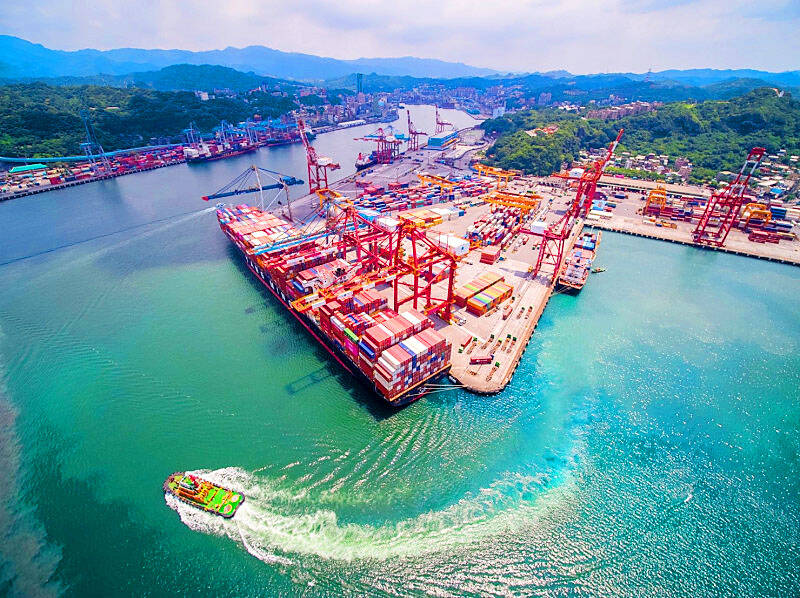The Ministry of Transportation and Communications yesterday announced plans to increase fines for origin laundering in free-trade zones to as high as NT$3 million (US$98,087), as part of its response to new US tariffs.
The proposed amendment to the Act for the Establishment and Management of Free Trade Zones (自由貿易港區設置管理條例) would increase penalties for firms that illegally re-export goods through Taiwan’s free-trade zones, which currently range between NT$30,000 to NT$300,000.
This is one-tenth of the Foreign Trade Act’s (貿易法) maximum penalty of NT$3 million for illegal transshipments or hiding the origin of goods.

Photo courtesy of Port of Keelung, Taiwan International Ports Corp
While it does not explicitly name China, it is understood that the measure is intended to prevent businesses from misrepresenting the origin of Chinese products.
Preventing illegal transshipments is a key government policy, the ministry said, adding that customs authorities would keep heightened monitoring, investigation and penalty measures in place.
Since May 7, the International Trade Administration has required that exporters of goods labeled as “made in Taiwan” to the US submit a certificate of origin.
The ministry has enhanced training for personnel, increased inspections and established a task force to oversee compliance with the free trade zone act, all aimed at stopping illegal re-exports.
The ministry is also considering increasing penalties of the free trade zone act to bring it in line with the Foreign Trade Act, which would result in a 10-fold increase.
It is currently proposing amendments to articles 17 and 38 — the former requires foreign goods be declared to customs, in accordance with regulations, and the latter imposes a fine of NT$30,000 to NT$300,000 and a six-month suspension from operating in the free-trade zone.
In more serious cases, a firm found to be illegally re-exporting goods could have its operating permit revoked.
The proposed amendment is in its public notice period. After, it would be sent to the Executive Yuan and Legislative Yuan for review.

In his National Day Rally speech on Sunday, Singaporean Prime Minister Lawrence Wong (黃循財) quoted the Taiwanese song One Small Umbrella (一支小雨傘) to describe his nation’s situation. Wong’s use of such a song shows Singapore’s familiarity with Taiwan’s culture and is a perfect reflection of exchanges between the two nations, Representative to Singapore Tung Chen-yuan (童振源) said yesterday in a post on Facebook. Wong quoted the song, saying: “As the rain gets heavier, I will take care of you, and you,” in Mandarin, using it as a metaphor for Singaporeans coming together to face challenges. Other Singaporean politicians have also used Taiwanese songs

NORTHERN STRIKE: Taiwanese military personnel have been training ‘in strategic and tactical battle operations’ in Michigan, a former US diplomat said More than 500 Taiwanese troops participated in this year’s Northern Strike military exercise held at Lake Michigan by the US, a Pentagon-run news outlet reported yesterday. The Michigan National Guard-sponsored drill involved 7,500 military personnel from 36 nations and territories around the world, the Stars and Stripes said. This year’s edition of Northern Strike, which concluded on Sunday, simulated a war in the Indo-Pacific region in a departure from its traditional European focus, it said. The change indicated a greater shift in the US armed forces’ attention to a potential conflict in Asia, it added. Citing a briefing by a Michigan National Guard senior

CHIPMAKING INVESTMENT: J.W. Kuo told legislators that Department of Investment Review approval would be needed were Washington to seek a TSMC board seat Minister of Economic Affairs J.W. Kuo (郭智輝) yesterday said he received information about a possible US government investment in Taiwan Semiconductor Manufacturing Co (TSMC, 台積電) and an assessment of the possible effect on the firm requires further discussion. If the US were to invest in TSMC, the plan would need to be reviewed by the Department of Investment Review, Kuo told reporters ahead of a hearing of the legislature’s Economics Committee. Kuo’s remarks came after US Secretary of Commerce Howard Lutnick on Tuesday said that the US government is looking into the federal government taking equity stakes in computer chip manufacturers that

US President Donald Trump on Friday said that Chinese President Xi Jinping (習近平) told him China would not invade Taiwan while Trump is in office. Trump made the remarks in an interview with Fox News, ahead of talks with Russian President Vladimir Putin over Moscow’s invasion of Ukraine. “I will tell you, you know, you have a very similar thing with President Xi of China and Taiwan, but I don’t believe there’s any way it’s going to happen as long as I’m here. We’ll see,” Trump said during an interview on Fox News’ Special Report. “He told me: ‘I will never do